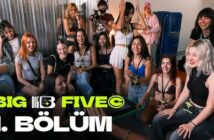[youtube]l_b_kJVd0ZA[/youtube]
Producer Paul Abbott began this session with a bang. « Life treads on your toes, and we keep writing drama like it’s linear screenwriting! » he exclaimed, shortly after audience members were given little cards promoting Hit & Miss, which features a sad little boy wrapped in a blanket, flanking a cold-eyed Chloe Sevigny in red, clutching a gun. « She’s not your typical dad, » the heading read.
« You can make high-concept drama feel more like real life, » Abbott said, calling Hit & Miss’s protagonist « a glock with a c*ck ». Then, thankfully, he explained: the series is about a transsexual hit(wo)man who must be both mum and dad to her son.
[youtube]6WkBB2JZxT8[/youtube]
« When you pitch that concept to people, they’re immediately intrigued by it, » Garanito said. « They have to see what it looks like! » She called this absolutely addictive viewing, « one of the coolest dramas I’ve worked on. »
As evidence of the show’s magnetism, Garanito said it’s already been pre-sold to the US, Australia, New Zealand and Israel.
One of the reasons why Hit & Miss works so well is because Abbott Vision cultivates and trains writers for a year in Manchester before letting them loose.
« We’ve got a range of university levers whom we spotted 3 years ago, » said Abbott. « What we do in that case is verse the student £2000 (€2400), which for a student is quite luxurious, to keep talking to us. » Writers are then brought into the year-long writers studio, where they work on drafts alone and then have days in the week to go over them together, so no one feels they’re working in isolation.
From this rich literary armada, Abbott chose the writer « crazy enough » to produce the concepts he wanted to see on-screen. In the case of Hit & Miss, that writer was Shaun Conway, who also wrote Brilliant Love and Kings of London.
« Whenever we talked to Paul and to Shaun, they had the vision so clearly in their heads, » said Garanito. « And we trust them. »
« That is the benefit of funding the writers studio! » said Abbott.
« We started our relationship [4 years ago] and Hit & Miss was on the slate already, » explained Garanito. There were two reasons why they signed the deal: for Paul, and for « this concept of a writer’s studio, this idea that quality content could be churned out in one large machine simultaneously. »
« You don’t feed the market what it wants. My belief is you’re meant to take an audience to an unexpected place, » said Abbott.
FremantleMedia « loved it because it didn’t look like anything else… and sometimes writers don’t think about the landscape that they’re throwing up at the audience. It’s just a story about family. » For that reason, « It’s got really magnetic grounding in real life. »
The real-life connection is important to Abbott. « The problem with watching high-concept stuff is it takes you away from your humanity… like sci-fi stuff. There’s plenty of good sci-fi out there, but when they say the Federation is coming I don’t know if it’s a good thing or a bad thing. It’s not a human thing. »
That’s not to say you focus solely on the art.
« You become a brand so you become a business, » Abbott conceded. « That’s not me, but you have to. If you want to sell, you need to learn a grammar that will translate to excited people who will give you the money to develop it. The big difference with the way we work is, the scarier our pitches, the more you smile. Because we can pull it off! So we don’t have to go through the polite parlour game. »





4 commentaires
Pingback: Hit & Miss – Cannes session « Jonas Armstrong Blog
Pingback: Transsexual bahrain | Findutahland
Pingback: Hit & Miss – Cannes Session « Quilts, Covers & Pillows
Pingback: Poi bisogna che… « [ In pain or on a diet ]